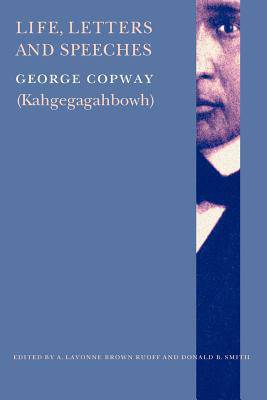
Bedankt voor het vertrouwen het afgelopen jaar! Om jou te bedanken bieden we GRATIS verzending (in België) aan op alles gedurende de hele maand januari.
- Afhalen na 1 uur in een winkel met voorraad
- In januari gratis thuislevering in België
- Ruim aanbod met 7 miljoen producten
Bedankt voor het vertrouwen het afgelopen jaar! Om jou te bedanken bieden we GRATIS verzending (in België) aan op alles gedurende de hele maand januari.
- Afhalen na 1 uur in een winkel met voorraad
- In januari gratis thuislevering in België
- Ruim aanbod met 7 miljoen producten
Zoeken
€ 41,95
+ 83 punten
Omschrijving
George Copway (Kahgegagahbowh, 1818-69), an Ojibwe writer and lecturer, rose to prominence in American literary, political, and social circles during the mid-nineteenth century. His colorful, kaleidoscopic life took him from the tiny Ojibwe village of his youth to the halls of state legislatures throughout the eastern United States and eventually overseas. Copway converted to Methodism as a teenager and traveled throughout the Midwest as a missionary, becoming a forceful and energetic spokesperson for temperance and the rights and sovereignty of Indians, lecturing to large crowds in the United States and Europe, and founding a newspaper devoted to Native issues. One of the first Native American autobiographies, Life, Letters and Speeches chronicles Copway's unique and often difficult cultural journey, vividly portraying the freedom of his early childhood, the dramatic moment of his spiritual awakening to Methodism, the rewards and frustrations of missionary work, his desperate race home to warn of a pending Sioux attack, and the harrowing rescue of his son from drowning.
Specificaties
Betrokkenen
- Auteur(s):
- Uitgeverij:
Inhoud
- Aantal bladzijden:
- 258
- Taal:
- Engels
- Reeks:
Eigenschappen
- Productcode (EAN):
- 9780803264632
- Verschijningsdatum:
- 1/04/2006
- Uitvoering:
- Paperback
- Formaat:
- Trade paperback (VS)
- Afmetingen:
- 150 mm x 229 mm
- Gewicht:
- 385 g

Alleen bij Standaard Boekhandel
+ 83 punten op je klantenkaart van Standaard Boekhandel
Beoordelingen
We publiceren alleen reviews die voldoen aan de voorwaarden voor reviews. Bekijk onze voorwaarden voor reviews.









